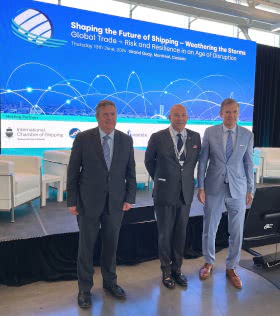
"This is a critical time for the
shipping. We are experiencing an unprecedented threat to the
free trade'. This was underlined by the President
of the International Chamber of Shipping (ICS), Emanuele Grimaldi, in
on the occasion of the summit "Shaping the future of shipping -
Weathering the storms", held a few days ago in Montreal,
which was organized by the ICS and the Chamber of Commerce
Canada's Seafarer to Discuss with Industry Leaders
of the challenges and risks that characterise trade
World.
 "The number of barriers to trade imposed
unilaterally by the nations - explained Grimaldi - is
increasing exponentially. Now I understand that the intentions
behind such barriers may be good, but the reality is
whereas trade is increasingly being used as a weapon, while
nations seek to gain greater economic or economic benefits
achieve policy objectives. Every year the sea transport -
added the ICS President - is responsible for the
transport of goods worth more than $14 billion, and
Every trade barrier to shipping has an effect on
amplifier that will have a negative impact on trade
global growth and will ultimately reduce growth
Generalized. The failure of global institutions such as the World Bank of Applied Sciences and Sciences
Trade Organization - Grimaldi denounced - further aggravates
This is a problem as we need strong institutions to
facilitate efficient and inexpensive trade between nations'.
"The number of barriers to trade imposed
unilaterally by the nations - explained Grimaldi - is
increasing exponentially. Now I understand that the intentions
behind such barriers may be good, but the reality is
whereas trade is increasingly being used as a weapon, while
nations seek to gain greater economic or economic benefits
achieve policy objectives. Every year the sea transport -
added the ICS President - is responsible for the
transport of goods worth more than $14 billion, and
Every trade barrier to shipping has an effect on
amplifier that will have a negative impact on trade
global growth and will ultimately reduce growth
Generalized. The failure of global institutions such as the World Bank of Applied Sciences and Sciences
Trade Organization - Grimaldi denounced - further aggravates
This is a problem as we need strong institutions to
facilitate efficient and inexpensive trade between nations'.
Recalling that in 2021 the ICS commissioned Harvard Kennedy
School of Government to examine the problem of protectionism,
Chairman of the Shipowners' Association pointed out that this
The study found that "the cutting of policies
Restrictive trade measures could boost the global economy by
more than three percentage points. The report - he specified
Grimaldi – also found that high-income nations
could see an average increase of 4.5% in their exports
of goods if they loosen tariff restrictions and do not
Businesses. Developing economies would see an increase
even higher, by 7%, if they were to reduce their restrictions in
"modest and fair". Over two trillion dollars
World imports, the ICS president noted, are
affected by constraints such as these, which is equivalent to the domestic product
Canada'.
Grimaldi pointed out that obstacles to trade had been put in place
also by the European Union with the introduction of the system for the
EU Emissions Trading (EU ETS) and the
Carbon Border Adjustment (CBAM): 'from the
publication of this report - he explained referring to the
study carried out by the Harvard Kennedy School of Government -
We have seen the introduction of new global regulations and taxes
that have a negative impact on trade. In Europe - ha
said Grimaldi - the EU ETS and CBAM proposals have created
systems that have an impact on free trade. In addition, Europe and
The U.S. is proposing to impose large tariffs on
electric vehicles made in China, all at a time when
We are asking the world to switch to electric cars. In the United States
United, some are even considering the idea
to impose tariffs on ships calling at U.S. ports
just because they were built in China. And, of course, the
Our associates in the tanker ship industry have to deal with
with the imposition of sanctions by governments in response to the
terrible attack on Ukraine by Russia."
"This rising tide of protectionism
Grimaldi - exacerbates the complexities for our industry and
It generates costs for our customers. The last thing we have
The need right now is a trade war. However
Protectionism is on the rise."
"From our point of view," agreed the president and
CEO of Canada's Chamber of Marine Commerce, Bruce Burrows - le
unilateral and protectionist initiatives of a nation, such as the
tariffs, not only do they fail to discourage actions, policies
and the practices of other nations, but they also harm the
national competitiveness on import-export markets and
increase costs for consumers. At a time when the world
is already facing significant challenges, including running
emissions and the availability of
Protectionism only translates into self-harm."